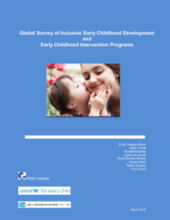This report presents the findings of a global survey designed to map current implementation of Inclusive Early Childhood Development (IECD) and Early Childhood Intervention (ECI) programs, among other objectives, and outlines recommendations based on those findings. The RISE Institute hosted the global online survey and worked jointly with UNICEF and the ECD Task Force (ECDtf) of the Global Partnership on Children with Disabilities (GPcwd) to create and distribute it in English, French, Portuguese, Russian and Spanish. This large survey was designed in 2016, was conducted in 2017, and the report was prepared in 2018. The main objectives of the survey were to:
- Map current implementation of IECD and ECI programs and related activities;
- Describe key IECD and ECI program features;
- Identify gaps and challenges in providing accessible IECD and ECI services;
- Document factors associated with successful implementation and scale-up; and
- Generate recommendations to inform future policy and program development and national planning and implementation efforts.
The online survey targeted a range of programs, and activities including IECD and ECI services; rehabilitation and habilitation services; humanitarian, emergency, and child protection services; advocacy campaigns; and research and evaluation projects. The survey solicited a broad range of information from respondents including implementing sectors, scope and geographic focus of program, target population, policy support, and program approach and objectives. Respondents also provided information on screening and referral services; program contents and characteristics; barriers to program development, expansion, demand, and quality; factors that enhanced program success; and information on program funding.
Among the key findings, the survey results indicate that the vast majority (93%) of IECD and ECI programs reported enabling at least one program role for parents, grandparents and legal guardians. Furthermore, the report's recommendations urge IECD and ECI programs to include family strengthening, prevention of institutionalization, and support for deinstitutionalization of young children in their program objectives.

